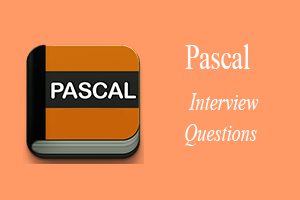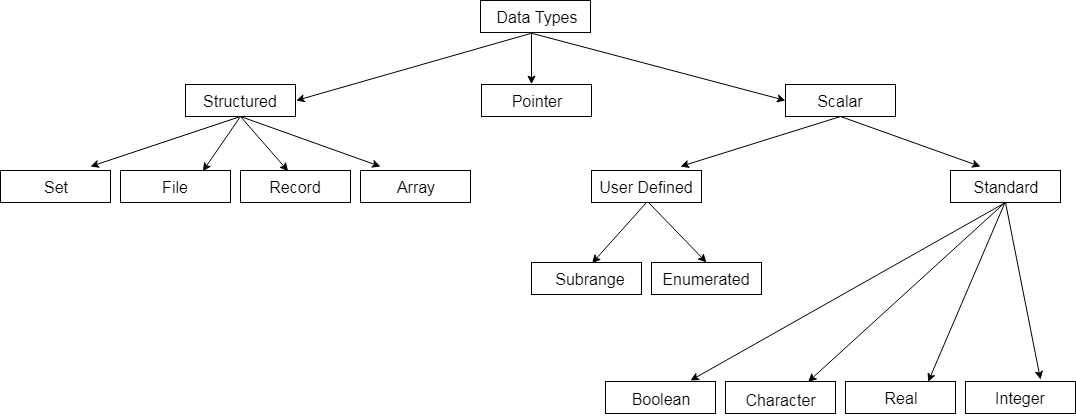Pascal Interview Questions
There is given Pascal interview questions and answers that has been asked in many companies. Let's see the list of top Pascal interview questions. 1) Explain Pascal.Pascal is an imperative and procedural programming language. It was developed in 1970 by Niklaus Wirth. It follows the basics of structured programming and data structuring. 2) Why Pascal is named as Pascal?The name Pascal was given in honor of the French mathematician, philosopher and physicist Blaise Pascal. 3) Who was the developer of Pascal language?Pascal is designed by Niklaus Wirth. 4) Which was the most influential language in Pascal development?Pascal was mainly influenced by ALGOL W language. 5) Which languages are influenced by Pascal most?Pascal influenced the following languages: Ada, Component Pascal, Go, Java, Modula, Oberon etc. 6) What are some distinguish features of Pascal?Following are some specific features of Pascal:
7) Why is it named Pascal?It is named in the honor of a great French mathematician and philosopher Blaise Pascal. 8) How do you describe a Pascal set?A collection of same type of elements is called a set. The elements in the set are called members. In Pascal, elements are enclosed in square bracket []. 9) What is a datatype? What are the different data types included in Pascal?A datatype specifies a range of values that a variable can store. It also includes the set of operations that are performed on different datatypes. Following are the different datatypes in Pascal:
Image: Pascal-datatype 
10) What is pointer in Pascal?In Pascal, a pointer is a dynamic variable which specifies the value of another variable. You must declare a pointer before you use it to store any variable address. 11) What are different Pointer concepts in Pascal programming?Following is a list of some important pointer concepts used in Pascal programming:
12) What is IP Pascal?IP Pascal stands for Interplatform Pascal. It supports the following platform in its current configuration:
13) What is unit in Pascal?Modules of Pascal programs are referred as units. A module or unit contains some code blocks, which contain variables and type declarations, statement procedures etc. There are many built-in units in Pascal. 14) What is the reason behind using UNITS in Pascal programming?There are three reasons to use UNITS in programming:
15) What are the different Pascal standards?The first Pascal standard was documented by the author of the Pascal programming language Niklaus Wirth but it was an unofficial Pascal standard. The first official standard was ISO 7185 issued in 1983. It was followed by the extended standard ISO 10206 in 1990. Another standard Object-Oriented Extension to Pascal was introduced but never completed due to lack of interest. 16) What is constant in Pascal? What constants are declared in Pascal?An entity which doesn't change is called constant. It remains unchanged during program execution. Following constants are declared in Pascal:
17) Write syntax to declare constants in Pascal.Syntax: 18) What are the REPORT methods for which the portability is given in Pascal?There are two REPORT methods for portability: Application: It contains a guideline which facilitates you to use implementation and features according to the compiler, to make the application more portable. Compiler: It is used to implement the language that is likely to implement the features like determining of the types compatible with one another. 19) How can you define a string in Pascal?A string can be defined in many ways:
20) What is the control structure used in Pascal?
21) What is the usage of Extension in Pascal?Extension makes the program more clean and portable to use by providing the interfaces to be used in programs. 22) Is Pascal designed to be a teaching language?Or Why Pascal is called teaching language?It is often said that Pascal is a toy language and not to built for real-world programming. Check, what the father of Python Niklaus Wirth said: "Occasionally, it has been claimed that Pascal was designed as a language for teaching. Although it is correct, its use in teaching was not the only goal. In fact, I don't believe in using tools and formalisms in teaching that are inadequate for any practical task." - Niklaus Wirth from the 1984 ACM A.M. Turing award lecture 23) What is the difference between apple Pascal and UCSD Pascal?
24) What is the difference between Turbo and Standard Pascal?
25) What is the difference between Modern Pascal and Standard Pascal?
26) What are the different insecurities involved in Pascal?Following are the main insecurities involved in Pascal:
27) Is there any Freeware Pascal compiler?Yes. One of the most recent and active freeware Pascal compilers is FPK Pascal. It is a 32 bit Turbo Pascal compatible compiler system for DOS and OS/2.28) What is the Pascal compiler used on HPCVL machines?The Pascal compiler installed on the Sun Fire system of HPCVL is the Gnu Pascal Compiler (GPC). It is a public-domain compiler that has a great deal of extensions and compatibility features built within it. It is portable. |
You may also like:
- Java Interview Questions
- SQL Interview Questions
- Python Interview Questions
- JavaScript Interview Questions
- Angular Interview Questions
- Selenium Interview Questions
- Spring Boot Interview Questions
- HR Interview Questions
- C Programming Interview Questions
- C++ Interview Questions
- Data Structure Interview Questions
- DBMS Interview Questions
- HTML Interview Questions
- IAS Interview Questions
- Manual Testing Interview Questions
- OOPs Interview Questions
- .Net Interview Questions
- C# Interview Questions
- ReactJS Interview Questions
- Networking Interview Questions
- PHP Interview Questions
- CSS Interview Questions
- Node.js Interview Questions
- Spring Interview Questions
- Hibernate Interview Questions
- AWS Interview Questions
- Accounting Interview Questions







